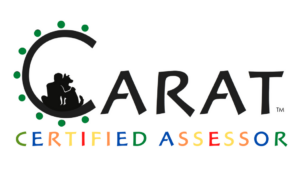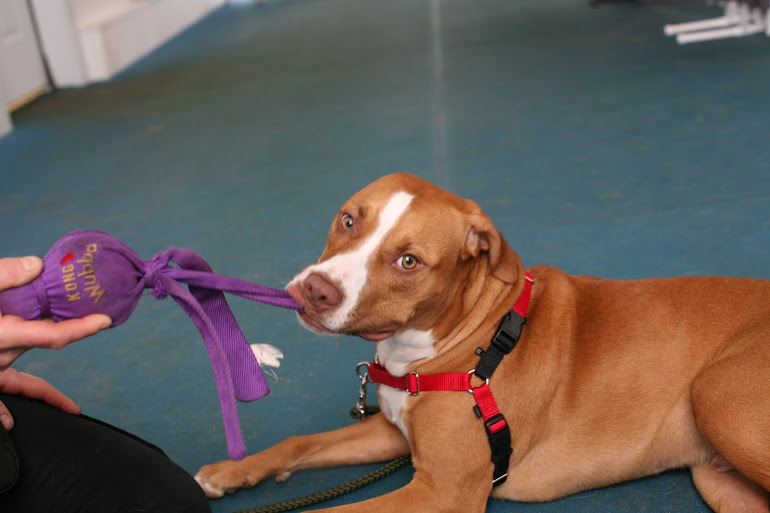
CERTIFIED CARAT ASSESSORS ARE UNIQUELY SKILLED…
As one of the first Certified CARAT Assessors in the U.S., Judy is proficient at reading dog body language and is recognized for her compassion and detailed approach to the individual animal. Mastering CARAT, taught by Suzanne Clothier, required several years of dedication and practice. Certification serves to recognize the study and effort put forth by the certified assessor in developing their skills and to ensure that the individual demonstrates proficiency in both the theoretical and practical applications of CARAT.
MY ASSESSMENT CAN HELP YOU….
- Determine which puppy should be placed with which family.
- Understand how this dog will respond in different environments.
- Identify what environments will be challenging or problematic for this dog.
- Identify what sport or task this dog will be successful performing.
- Determine if a particular dog is a good fit for you and your family.
- Identify if this dog will be safe around family and friends.
Developed by Suzanne Clothier in 2007, CARAT (Clothier Animal Response Assessment Tool) CARAT Ethology of the individual is a novel assessment system that categorizes behavior traits in multiple components that are intuitive and practical.
CARAT takes a detailed view of the individual dog as a unique combination of many factors working together to influence, exacerbate, mitigate and enhance each other. In the profile created by the nuances and specifics of this complex interaction of multiple traits, an accurate picture is created of the individual, regardless of breed or age.
CARAT is unique in its recognition that a response to any given stimulus can either inhibit or activate the animal, attract the animal or create avoidant behavior, and that the distinction between the two is critical in understanding the individual. For example, a dog who reacts quickly and avoidant to a sudden noise is demonstrating a different response than a dog who reacts quickly and towards the same noise.
At all times, behavior is assessed according to how productive, functional, or adaptive it may be, with a full understanding that what may be productive, functional or adaptive in one context may not be in another context. For example, there would be great differences in the CARAT profiles for a successful guide dog, competitive agility and a suitable companion for an elderly person with mobility issues.


What Does CARAT Assess?
CARAT looks at these main categories and specifics of temperament traits:
- CORE: Arousal, Resilience, Energy
- SOCIAL: Sociability, Social Tolerance, Social Use of Space
- SENSORY: Visual, Auditory, Kinesthetic, Olfactory
- PERSISTENCE: Visual, Auditory, Kinesthetic, Olfactory, Predatory/Chase
- INTERACTIVE: Patience, Biddability w/Familiar, Biddability w/Stranger
- Complex traits: Social Confidence, Environmental Confidence, Self Modulation
How Is CARAT Scored?
CARAT is a scoring tool, meant to be used in conjunction with tests created by Suzanne Clothier in 2007, and adapted by various guide & service dog schools as well as others. CARAT may also be utilized to assess dog behavior in informal settings, as well as under other testing situations. Because CARAT is based in observation and patterns of response, it is broadly applicable in any setting where a dog can be observed.
CARAT is scored on a bi-directional, exponential failure scale that places a score of 0 at the mid-point as adaptable, productive behavior. Scores occur at or away from the mid-point of 0 increases in half-points to a maximum of -4 (left shift away from 0) or +4 (right shift). Complex traits are scored on 0-5 scale. Every score point has operational terms of observable behavior, helping to keep scoring consistent.
I can help you choose the right puppy for your family
- Shy, hesitant, resilient
- Although worried about the new environment, she improved quickly.
- She will need a patient owner to socialize her.
- She will be easy to train as she loves food, in familiar settings.
- She is not very social with unfamiliar, but does enjoy petting.
- Fairly patient but whined a bit
- Playful pup who showed no guarding
- Social, confident, energetic, resilient
- She will navigate any environment and greet people willingly
- Easy to train and very agreeable
- She is not a patient girl
- Hesitant with noise
- Performance dog (her patience is too low for Therapy)
- Shy, environmentally worried, has his own agenda, guarding possible
- He will greet people with prompting, enjoys petting (should test him with kids)
- He needs support in most new settings and may take flight if frightened
- Needs slow greetings with dogs – no daycare
- Will likely chase squirrels, cats and maybe cars.
- Will need an experienced owner to teach fetch and drop to avoid guarding
- Social, environmentally confident, easy
- He will navigate any environment and greet people when called
- Easy to train as he is very agreeable
- Appeared dog friendly
- Fine with kids petting and showed no auditory sensitive
- Easy dog for first time dog owner
- Shy with people, environmentally worried, has his own agenda, pushy, guarding possible
- Needs support in most new settings, improves quickly.
- Social if prompted, and does not enjoy petting from strangers
- Will do well with dogs
- May enjoy chasing squirrels and cats, has a full mouth grip.
- Will need an experienced owner to teach fetch and drop to avoid guarding
- Fear Free Vet care is recommended for gentle body handling.

